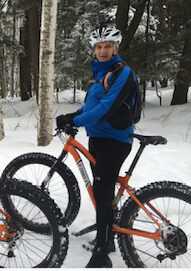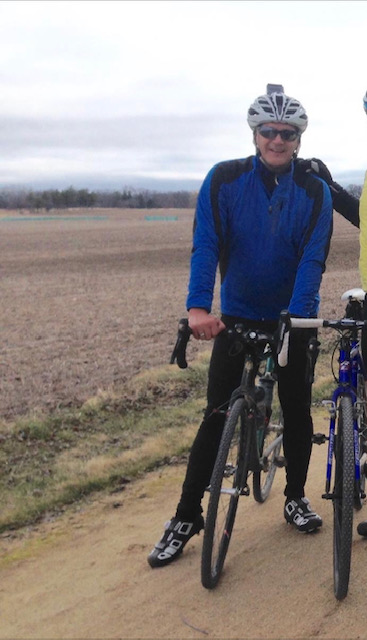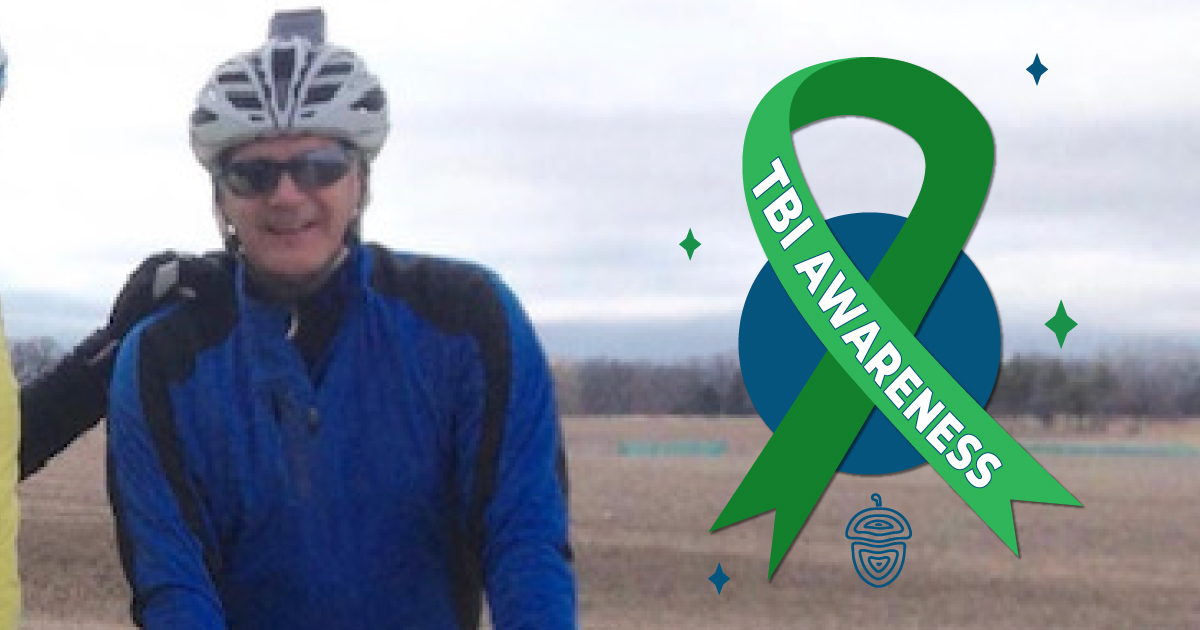“Everything was wiped out the second his bike fell.”
After Lorrell was struck in a hit-and-run accident while cycling in the early morning hours, his entire life as he knew it was completely flipped around. Sustaining a traumatic brain injury (TBI) not only meant months to years of ongoing recovery, but it also meant having to recreate a new life and adapt to an entirely different world. Now, Lorrell and his wife, Michelle, share their story to spread awareness for brain injury survivors and encourage others to find hope, even in the simplest of things.

Meet Lorrell, A TBI Survivor & Oakwood Member
A Salt Lake City native, Lorrell is an analytical and highly educated professional with a brilliant reputation. Lorrell received his MBA in Engineering, went on to work for American Express in their international fraud department, and later joined Discover Financial Service’s team. After being employed by Discover, Lorrell was invited to travel to Chicago for work. He was slated to stay there for two years; however, everything quickly changed after an accident left Lorrell with a TBI just weeks before he was to return home to Arizona.
The Accident That Changed Everything
On June 13, 2016, Lorrell was struck while riding his bicycle in what authorities later presumed was a hit-and-run. At the time, Lorrell was an avid cyclist and was known to bike 26 miles one-way, three days a week while living in Arizona. After his work brought him to Chicago, Lorrell became a member of a team of local cyclists who met near Lake Bluff and biked a remarkable 200 miles per week.
At the time of the accident, however, Lorrell was biking alone, and, to this day, he does not recall anything of what happened during the accident. But, because of Strava – an exercise tracking application both Lorrell and his team were privy to – his family and fellow cyclists could see just a tiny blip of the accident recorded. At approximately 6:30 am, Lorrell had spun into the air going at about 15 mph, and then abruptly came back down when the application had suddenly stopped working.
Michelle, Lorrell’s wife, was back home in Arizona at the time of the accident. She says that Lorrell was struck in a rural part of Chicago with hardly anyone around. Luckily, a college student heading home had seen Lorrell lying in the road unconscious and quickly contacted the police, who then dispatched a trauma unit to their location.
Back home in Arizona, it was about 4:00 in the morning when the trauma hospital in Chicago called Lorrell’s daughter, Bree, to notify her of the accident. As a nurse, Bree immediately grasped the gravity of the situation, understanding that Lorrell was unresponsive and was presumed not to make it through the day. Bree, Michelle, and the rest of their family immediately booked their flights to Chicago to be with Lorrell. Michelle recalls this moment in time rather vividly, noting how responders couldn’t find Lorrell’s pulse and truly believed he was gone.

Lorrell’s TBI Recovery

Lorrell was admitted to the hospital’s ICU for three months, where he remained in a coma for a few weeks and had even been placed on life support. The morning after his accident, Lorrell and his family were introduced to a neurosurgeon who performed surgery that same day to combat the excessive bleeding in Lorrell’s brain. First, the neurosurgeon opened Lorrell’s skull along the sides of his temples, leading towards the back of his head, and determined he had sustained multiple skull fractures. Then, he carefully rebuilt Lorrell’s right eye and orbital bone. The neurosurgeon later declared Lorrell’s passion for cycling as the very thing that saved his life. Michelle explained, “because he was so healthy, his natural resting heart rate was so low that it saved him from bleeding out on the pavement”.
Due to short-term memory loss resulting from the TBI he sustained, Lorrell says he does not remember the accident or his time in the hospital’s ICU or the specialized facility he transferred to. However, Michelle jokes that Lorrell became a bit of a Houdini during this time. He always found ways to escape his restraints, including the zipper bed at RIC (now known as Shirley Ryan AbilityLab), an enclosed specialized facility in downtown Chicago.
They had to strap him down to the bed and get a full-time sitter because he would try and undo [the restraints]. They had him in a zipper bed because he still couldn’t walk or function at all. They zipped him up, and he took the urinal and cut his way out. He is an engineer, so I think, in his mind, even though he couldn’t relate to where he was or what was happening, you could see he was still thinking.
Staying Positive Despite Having A TBI
Even though there were still familiar gears turning in the back of his mind, Lorrell’s TBI now meant having to relearn certain things and accepting when it was okay to slow down. So when Lorrell returned to Arizona, he joined an intensive therapy and rehabilitation program at Barrow Neurological Institute’s Center for Transitional Neuro-Rehabilitation, which included full-time physical therapy over 18 months, visits with psychologists and neurologists, mandatory meetings three to four times a week, and even art therapy.
When asked what keeps him feeling positive despite the drastic changes to his health and lifestyle due to his TBI, Lorrell stated it was the recovery programs that were the greatest help. These programs taught him the importance of slowing down and knowing that his brain injury makes things happen a little slower.
The thing I remember most is I had to slow things down. So, a lot of the rehab program was around people slowing things down, writing things down, [thinking] through what you’re going to do [and] what you’re going to say, and knowing that your brain injury is making things a little bit slower for you. That’s how I stay positive is because of that one thing – learning how to slow down.

Lorrell went on to say that, in hindsight, he thinks he became a more positive person since the accident. Before, Michelle says Lorrell was a quiet and analytical person, the typical engineering persona. “He was good at everything,” she says. Now, Lorrell leans more towards the side of caution and is incredibly outgoing and sociable.
Even though Lorrell tends to be more cautious since his accident out of fear he might be injured again, he sometimes still experiences moments of compulsiveness at the hands of his TBI. Michelle and Lorrell both recall when he snuck out one night to take his bike for a ride but fell and fractured his ankle. Lorrell then had to undergo three surgeries to insert a plate and nine screws into his ankle. It has been about a year since this accident, and Lorrell continues to improve daily, but his road biking days are now part of the past. However, in knowing how much passion Lorrell has had for biking, Michelle bought Lorrell a stationary bike as a new way of allowing him to enjoy one of his favorite activities still.
Finding Hope For The Journey Ahead
What gives Lorrell hope in the present is feeling like he can help people. He believes there is an opportunity to provide ideas, speak up, and not so much worry about what others are thinking. He notices when others might have the urge to speak but don’t, so he takes every opportunity to speak up for them, no matter how big or small the situation may seem. But, more than anything, Lorrell wants to be supportive.
He says Oakwood Creative Care has become a comfortable and safe place that allows him to connect with others and share his support. Lorrell makes it a point to give it his all, and both he and his wife find Oakwood’s Day Club programs invaluable in providing stimulation and engagement throughout each week.
The painting with watercolors and the acrylic, that is new to me. I like actually making something physical and seeing it hanging on the walls. That, to me, is a good thing that I remember. Some of them require, for me, a lot of mental thinking about what goes with the colors. I mean, it’s simple – but that has really helped me.
How Michelle Finds Hope As A Caregiver
As Lorrell’s wife and his caregiver, finding hope is equally essential to Michelle. She said “Hope has been a struggle but, luckily, I think in our family we have always practiced finding joy. Now, I find joy in everyday simple things. There’s just so much joy everywhere, and that gives me hope that I can get through the next day – because sometimes, the days are really, really tough. I think hope is literally just finding joy in every day”.
Michelle and Lorrell would encourage other families living with a TBI like they are to find a place like Oakwood. In the beginning, Michelle admits that the caregiving journey is a rather lonesome one. Her suggestion to other caregivers who may be new in their role is to reach out for help and find support groups.
Michelle also recommends to other caregivers that they find something they love that offers an escape from the world of TBI. Since becoming Lorrell’s caregiver, Michelle always makes sure she takes time for herself to enjoy some of the activities she loves most, such as line dancing, rowing, and listening to crime podcasts. She understands how quickly caregiving can suck someone under, given the round-the-clock, 24/7 responsibilities; however, Michelle also recognizes that she can be a better caregiver for her husband when she can designate time to recharge and take care of herself.
Try and find resources like this. This program, Oakwood, has been life-changing for me because it has been so isolating the last few years.
Showing Support To TBI Survivors & Families

The effects of TBI can vary from person to person, with no two cases being exactly alike. For someone who has never experienced it, Lorrell and Michelle would encourage an understanding of knowing there are varying degrees of TBI. Some survivors may be able to engage in full-length conversations, while others may need more time to process and put together smaller words. In many cases, overstimulation can create communication barriers that lead to feelings of disengagement, exhaustion, anxiety, or aggression. Speaking in short and concise sentences may help avoid situations like these.
More importantly, both Michelle and Lorrell would encourage others to engage in conversations directly with the TBI survivor, versus looking immediately to their caregivers. For example, instead of asking their spouse or son/daughter how they are doing, invite the TBI survivor into the conversation by asking them directly how they are feeling, where they want to go, or what they would like to do for the day.
You’ve got to celebrate the new person. Find the good things you are in sync with now. Be understanding of their personality. Take him out, engage with him, and ask him the questions.
Above all else, Lorrell and Michelle wish for others to recognize that, while a brain injury is internal and the effects might not be outwardly noticeable, it should still be treated the same as any other illness or disability – with patience, love, and kindness.




